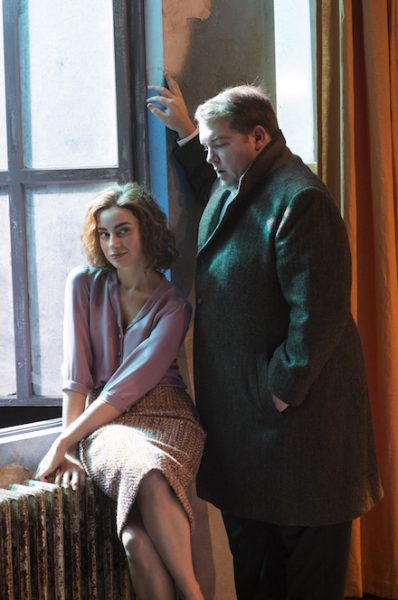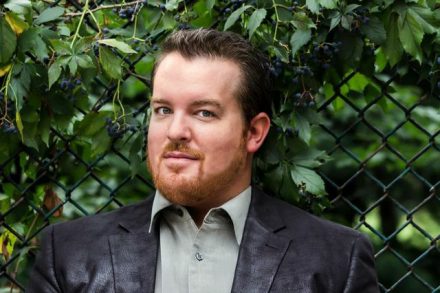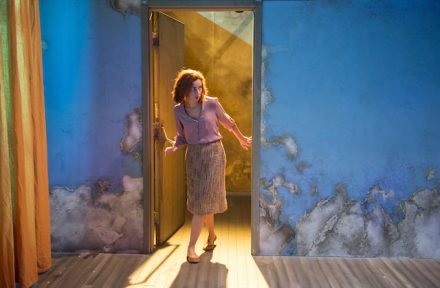(ANNANDALE-on-HUDSON, N.Y.) – The first fully staged American production of Antonin Dvorak’s 1882 grand opera Dimitrij opens at Bard SummerScape on Friday, July 28, and runs for two weekends, through August 6. The new production, performed in Czech with English supertitles, has been created expressly for SummerScape 2017 by Bard alumna Anne Bogart, co-founder of the acclaimed SITI Company.
Starring tenor Clay Hilleyy, winner of the New York Wagner Society’s Robert Lauch Award, with music director Leon Botstein leading the American Symphony Orchestra and the Bard Festival Chorale under James Bagwell, Dmitrij’s five performances take place in Bard’s Frank Gehry-designed Fisher Center (July 28, 30; August 2, 4, 6), with an Opera Talk, free and open to the public, before the matinee on July 30.
Set to a libretto by Marie Cervinkova-Riegrova, one of the relatively few 19th-century women to contribute to the genre, Dvorak’s grand opera is rarely produced outside the Czech Republic, and only received its U.S. concert premiere more than a century after its composition. Yet in its depiction of the struggle for power after the death of Boris Godunov, the opera has been hailed as “a tragic story that Shakespeare could hardly have bettered” (Boston Globe), and, as a showcase for Dvorak’s signature lyricism and masterfully stirring choral writing, it remains “a perfect example of a forgotten opera that deserves to be given exposure” (New York Times).
Bard’s historic presentation of the critical edition by Czech scholar Milan Pospíšil restores the 1882 original version of the Prague premiere, including the composer’s original, brutal conclusion.
Knowing Dimitrij’s absence from the operatic canon, when Bogart first approached the opera, her expectations were low. And yet on closer acquaintance, she found herself unable to account for this omission. She says:
“The more I look at the opera – the architecture of the piece and the absolutely gorgeous music – the more I am completely bewildered why it’s not done all the time, why it’s not a stable part of the repertoire in the opera world.”
About her vision for the upcoming production, she explains:
“For me it was important to set Dimitrij at a time analogous to the ‘Time of Troubles’ in Russia, when the world order had altered and no one knew whether to support or resist the new hegemony. Of course this instability is very familiar and resonant to our own current moment. I could have set our production in the present but instead I opted for the slight distancing of a time reminiscent of 1989 Berlin. Our Dimitrij takes place at the moment in history when Communism had collapsed but it was not yet clear what shape the future might take.”
Clay Hilley, who “commands the stage” (Main-Post, Germany), sings the title role, opposite soprano Melissa Citro, who – having impressed Opera News with her “fully nuanced portrayal” of Dvorak’s Rusalka – makes her festival debut as Dimitrij’s Polish wife, Marina.
Completing their fatal love triangle as Godunov’s daughter, Xenie, is Russian soprano Olga Tolkmit, a Golden Mask Award-nominee with a “resonant, bright-voiced soprano” (Financial Times). Nora Sourouzian, “a velvet-voiced mezzo-soprano from Canada with an arresting stage personality” (The Telegraph, UK), sings Marfa, widow of Ivan the Terrible; Levi Hernandez, who boasts an “impressive knack for subtle text-painting within a pristinely negotiated coloratura line” (Opera News), embodies Prince Shuisky, leader of the Godunov faction and eventual murderer of Dimitrij; and Joseph Barron lends his “rolling, imposing baritone” (Opera Today) to the role of General Basmanov, who leads the doomed pretender’s supporters. Rounding out Bard’s cast as Jove, Neborsky, and Bucinsky respectively are bass Peixin Chen, bass-baritone Roosevelt Credit, and baritone Thomas McCargar, a member of the Grammy Award-nominated Choir of Trinity Wall Street.
Stanislaw Moniuszko’s Halka (1858), Bard Music Festival Program 9
The Bard Music Festival also offers an all-too-rare opportunity to see Halka (1858), the four-act masterwork with which Stanislaw Moniuszko ensured his legacy as the father of Polish opera (August 19). Set to a politically charged libretto, Halka is regularly performed in Poland but remains virtually unknown abroad, despite being “redolent with the melodic flavors of Polish folk music and balladry” (New York Times), and welcomed as “melodious, affecting and appealing: … a rare treat” (Washington Post).
Anchored by the American Symphony Orchestra and Botstein with the support of Bagwell and the Bard Festival Chorale, Bard’s semi-staged production stars Polish-American soprano Amanda Majeski, whose honors include first prize at the Palm Beach Opera Vocal Competition, in the title role. Singing opposite her as her faithless lover is Aubrey Allicock, whose “bass-baritone has a distinctively glossy, warm color, with increasingly impressive freedom and fullness at the top of its range” (Opera News), with mezzo-soprano Teresa Buchholz – winner of the female division at Carnegie Hall’s Nico Castel International Master Singer Competition – as his kind-hearted young bride. Liam Moran, a “sturdy bass who sings with affecting gravity” (New York Times), plays Halka’s father, and Miles Mykkanen, who impressed Opera News with his tenor’s “sheer vocal gold,” completes the cast as the old friend whose love for her remains unrequited.
Returning to helm the semi-staged production are director Mary Birnbaum, scenic designer Grace Laubacher, and lighting designer Anshuman Bhatia, the creative team behind last year’s double-bill of Le Villi and La Navarraise. “A director of real quality” (Houston Press), Birnbaum is an International Opera Awards finalist whose work is “a dazzling display of inventiveness and … delight” (San Francisco Chronicle).
Opera at Bard SummerScape 2017
Antonín Dvorak (1841-1904)
Dimitrij (1882)
American Symphony Orchestra
Conducted by Leon Botstein, music director
Directed by Anne Bogart
Set design: David Zinn
Costume design: Constance Hoffman
Lighting design: Brian H. Scott
Movement director: Barney O’Hanlon
Hair and makeup design: Jared Janas and David Bova
Dimitrij: Clay Hilley, tenor
Marina: Melissa Citro, soprano
Xenie: Olga Tolkmit, soprano
Marfa: Nora Sourouzian, mezzo-soprano
Jove, The Patriarch: Peixin Chen, bass
Shuisky: Levi Hernandez, baritone
Basmanov: Joseph Barron, bass-baritone
Neborsky: Roosevelt Credit, bass-baritone
Bucinsky: Thomas McCargar, baritone
Sosnoff Theater
Friday, July 28 at 7:30 pm*
Sunday, July 30 at 2pm*
Wednesday, August 2 at 2 pm
Friday, August 4 at 7:30 pm
Sunday, August 6 at 2 pm*
Tickets start at $25
Opera Talk
July 30 at 12 pm
Free and open to the public
Opera in the 2017 Bard Music Festival, “Fryderyk Chopin and His World”
Stanis?aw Moniuszko (1819–72)
Halka (1858)
Bard Festival Chorale
Conducted by James Bagwell
American Symphony Orchestra
Conducted by Leon Botstein, music director
Directed by Mary Birnbaum
Scenic design: Grace Laubacher
Lighting design: Anshuman Bhatia
Choreography: Adam Cates
Halka: Amanda Majeski, soprano
Jontek: Miles Mykkanen, tenor
Janusz: Aubrey Allicock, bass-baritone
Zofia: Teresa Buchholz, mezzo-soprano
Stolnik: Liam Moran, bass
August 19
Program Nine, The Polish National Opera: Halka *
Sosnoff Theater
7 pm Preconcert Talk: Halina Goldberg
8 pm Performance*
Tickets: $25–$75
SummerScape 2017: other upcoming key performance dates by genre
MUSIC
Bard Music Festival, Weekend One: “Chopin, the Piano, and Musical Culture of the 19th Century” (Aug 11–13)
Bard Music Festival, Weekend Two: “Originality and Influence” (Aug 18–20)
FILM SERIES
“Chopin and the Image of Romanticism”
Ottaway Film Center
Thursdays and Sundays, July 27–Aug 20
Tickets: $10
SPIEGELTENT
Live Music, Cabaret, Festival Dining, and After Hours salon
Dates, times, and prices vary
Tickets for all Bard SummerScape events are now on sale. For tickets and further information on all SummerScape events, call the Fisher Center box office at 845-758-7900 or visit Bard SummerScape.
Venues:
SummerScape opera, theater, and dance performances and most Bard Music Festival programs are held in the Sosnoff Theater or LUMA Theater in Bard’s Richard B. Fisher Center for the Performing Arts, designed by Frank Gehry and celebrated since its opening as a major architectural landmark in the region. Some chamber programs and other BMF events are in Olin Hall, and the Spiegeltent has its own schedule of events, in addition to serving as a restaurant, café, and bar before and after performances. Film Series screenings are at the Jim Ottaway Jr. Film Center in the Milton and Sally Avery Arts Center.



